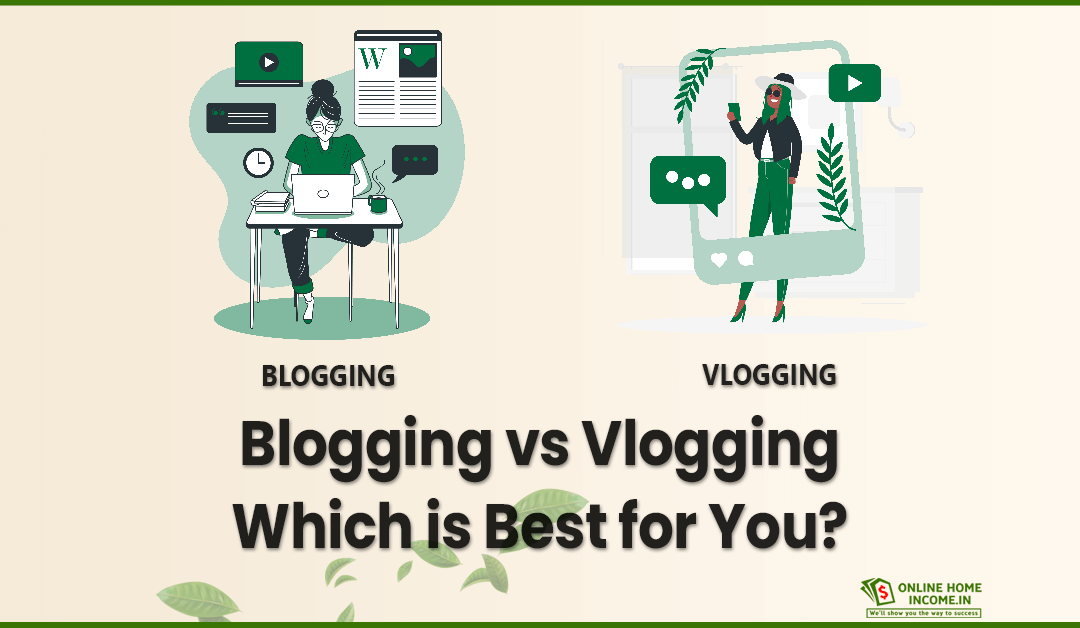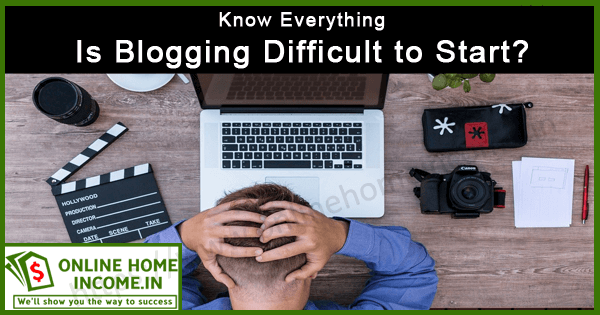Are you confused about whether to start a blog or a vlog? This article will help you analyze blogging vs vlogging and figure out what best suits you.
The world of blogging has gone through a sea of changes in the past two decades. What started as a hobby for logging experiences online is now a money-making full-time gig for many.
Earlier bloggers used to write about their experiences on websites like Blogger (acquired by Google).
Over time, bloggers have started publishing blogs on their own websites. Thanks to Content Management System (CMS) tools like WordPress(WP), Joomla, etc.
With the advent of YouTube, vlogging or video-logging is growing simultaneously, like blogs. Videos started becoming complementary or alternate content forms, catering to a wide range of audiences.
- More than 114 million active YouTube channels are publishing vlogs or informative videos today.

For someone new, entering the domain of content creation, it can be confusing to decide which channel to prioritize.
Some common concerns include;
- Do blogs or vlogs make more money?
- Can a blog be a vlog?
- What are the pros and cons of blogging and Vlogging?
- Who is more successful in the long term? Blogger vs Vlogger?
Let us get the answers to these questions from the following sections.
We will also learn in-depth about the scope and future of blogging and vlogging.
Key Difference Between Blogging vs Vlogging
Today, content creation is the most popular channel for us to earn an income.
People from diverse backgrounds give informative or entertaining content in all possible niches. From toddlers to octogenarians, homemakers to skilled professionals are a few examples.
Blogging focuses on textual content creation, while vlogs are video-based blogging.
Most successful bloggers focus on creating content in either channel to improve their follower count and subsequent income.
Let us see the difference between blogging and vlogging for creating content.
What is a Blog and a Blogger?
A blog is a weblog where one writes about their experiences and expertise.
Blogs are informal articles conveyed like stories for etching in the readers’ minds.
The one who writes and publishes blogs is a blogger.
This blog OnlineHomeIncome, is my brainchild that has been growing over the past eleven years.
I share my experiences of earning passive sources of income and the opportunities of working from home.
Unlike popular misconceptions, blogging does not require one to be a language expert.
If you have a penchant for storytelling in any language of your choice, you can choose to blog.
If you have rich experiences in any domain and find a demand for content in those areas, your blogs will make an impact.
What is a Vlog and a Vlogger?
In contrast, a vlog is a blog in video format. Vloggers post vlogs on various video-streaming channels and apps online.
Vlogging also involves storytelling, but is more comfortable for those who prefer directly narrating information to writing.
I also run a YouTube channel under the name Myilraj G. You will find the same topics I cover in my blog in video formats.
Depending on your interest and time, you may choose short or lengthy videos to watch.
To become a vlogger, you will need some expertise and help in taking videos and editing them.
When deciding on blogging vs vlogging, you must focus on your domain strengths and build skills for writing and video making.
If you excel in both, you can simultaneously blog and vlog.
Why I Prefer Blogging as a Career Option?
The reason why many Internet users prefer blogs is their easy readability and user-friendliness. Flexibility in content creation makes blogs an evergreen content form.
No matter how many content forms come and go, text content will always have an audience.
Videos, images, etc., trends depending on the need and time. In terms of efforts, it is easier to update blogs over vlogs.
Increased blog viewership gives you money-making opportunities with Google AdSense, affiliate marketing, and guest posting ventures.
Anyone can venture into blogging. But, you need to possess consistent writing skills with a determination to serve a purpose to your audience.
Also, blogging yields returns over a long period. It took me 6 months to witness $5 coming into my account from Ads.
Blogs require minimal investments, like a website, tools for writing and proofreading, etc.
In my case, I started blogging in 2013 while working in another job.
By 2015, I left my full-time job thanks to the continuous profits from my blog.
The consistent efforts I put into my blog posts continue to provide me with a consistent income.
So, I will always prefer blogging any day.
Why Vlogging is Growing Popular?
Thanks to social media channels like YouTube, Instagram, WhatsApp, Snapchat, Facebook, etc., video uploading and sharing are easier than ever.
Smartphone users love seeing and scrolling past countless Instagram Reels and YouTube Shorts.
Smartphones with high-definition cameras are easily accessible, prompting anyone to own them and take HD-quality videos.
As a result, millions of vloggers are mushrooming in every part of the world.
Visual content like videos, slideshows, etc., has a great visual appeal. Moreover, talking in vlogs helps vloggers establish a personal connection with the viewer.
Like blogs, increased viewership through YouTube fetches monetization opportunities.
You can partner with peer vloggers, promote local businesses, and have live sessions with your audience to improve your follower count and get more profits.
Vlogging also requires sufficient investments, like blogs. Rather than a website, you must invest in a smartphone with a good-quality camera (or a DSLR camera) and a microphone to take top-notch videos.
Then, upskill yourself by learning the latest video editing technologies, AI tools, etc. Invest in acquiring the required video editing software.
Editing each video is a time-consuming process. Also, you must make your videos SEO-friendly.
This process involves optimizing your video title, description, thumbnail, tags, and video frames with the exact content a user will look for.
So remember that vlogging is not just taking a video and uploading it. Vlogs also take their own time to reach the right audience and yield profits.
Which is better: blogging or vlogging? Let’s find.
From what we learned so far, you must clearly know the differences between blogging and vlogging.
Both are popular ways to share content and earn money. However, there is no straightforward pathway to earn money through these channels.
Each blogger takes time to start seeing revenue. The same applies to a vlogger.
Consistent efforts to provide informative content, update it according to trends, and promote your content are crucial.
Now let us assess what works best for you in choosing between being a blogger vs a vlogger.
1. Assessing Personal Strengths and Preferences
The first criterion in choosing between blogging and vlogging is how you will present your content.
- Blogs focus on the textual content, while vlogs require attractive videos.
Start by assessing your natural skillsets or something that comes to you easily.
- How good are you at talking and convincing people?
- Do your friends or peers love to listen to your stories?
- Can you speak fearlessly in front of the camera? Rather, you must be able to treat the camera like a friend hearing you out.
- How comfortable are you in hearing your own recorded voice and viewing yourself on-screen?
If you can get convincing answers to the above queries, you have a bright future in vlogging.
- Do you have a natural flair for writing? Have you received any appreciation for your write-ups?
- Are you lexically strong in any language of your choice?
- Have you come up with engaging posts on your social media pages? Could you get sufficient discussions on such posts?
If you could tick the options in the above checklist, you can try a stint as a blogger.
Moreover, if you are camera-shy and wish to let your content do the talking, blogging is the choice for you.
2. Consideration of Target Audience and Niche
Whether you choose to blog or vlog, you must choose a niche after thorough research.
Providing content on oversaturated niches can make you disappear in a sea of bloggers and bloggers.
However, audiences prefer different forms of content. Sometimes, the preferred content changes with the domain too.
For instance, most viewers prefer lifestyle vlogs over blogs. You don’t see celebrities writing blogs about their daily routines.
But, our social media feeds are flooded with every influencer posting vlogs on topics like “What I eat in a day”, “one day in my life…”, etc.
Topics like gold price analysis and stock market updates are best viewed as blogs.
One can refer to past values, learn prerequisite content through internal links in a blog, read the analysis and predictions, and so on.
So, understand how the audience wants to see content in that domain.
Some niches require both blogs and vlogs for the same topic.
The best example of these is cookery blogs. People love to see aesthetic cooking videos.
However, they also wish to have a written recipe available online for reference.
So, analyze the competition in your chosen domain before choosing to blog or vlog.
3. Evaluation of resources and investment
Blogging and vlogging are not free. Both channels come with initial investments and maintenance or upgrade costs.
In blogging,
One must invest in a unique domain name that helps readers recognize your blog as a brand.
Then comes developing a blog where you can regularly publish your content.
Third, you must also rent a hosting server to host your blog for access across the web.
Additionally, you must invest in grammar-check and proofreading tools to improve the quality of your content. Some tools offer free trials, while others offer packages for a fee.
Similarly, vlogging requires you to invest in a camera and a tripod stand to shoot high-definition videos.
Remember that good quality videos viewable on all devices get more views and rank high in video SEO.
If you need to keep moving and take videos on your own, you must invest in supporting devices like a selfie stick, phone stands attached to your vehicles, etc.
Also, you must learn and invest in the required editing software.
(A lot of free video editing tools are available, but when vlogging in a competitive domain, be prepared to invest in a good editing software suite.)
4. Long-term Goals and Sustainability [Vlog vs Blog]
As a content creator, you must aim to create a brand for yourself. Your brand’s success is determined by the quality of content that you provide consistently.
Through your content and increasing viewership, you establish yourself as an authorized expert in your niche.
In terms of long-term content sustainability, blogs are evergreen. As long as you publish content that is relevant even in the future, your old blog posts will continue to attract those searching for it.
No wonder bloggers continue to earn monthly revenue in lakhs even if they post a blog once a month or two.
All you need to do is keep your blogs updated as per the latest SEO algorithms.
- It involves updating your blog’s keywords based on user search volume, updating images, user experiences, etc., without deleting old posts.
On the other hand, vlogs are difficult to update. Moreover, the content shown in your videos can become outdated or irrelevant.
It means you have to re-shoot the same content according to the latest trends.
For example,
You may have posted a recipe with you cooking on a gas stove. A few years later, you are compelled to re-shoot the same video cooking on an induction-based stove to meet audience demands.
5. Content Creation Process in Blogging and Vlogging
Planning a content calendar helps you keep track of your publishing frequency. Whether you are into blogging or vlogging, plan your publishing schedule.
- Plan to create, edit, and promote each content post within the planned time frame.
You must do thorough research on the topics and subtopics on which you will be providing content.
Then, create a plan for the next year and spread out your content publishing timeline over regular intervals.
When you blog,
You must aim to publish one long-form blog post every week.
Within this time frame, you must cover keyword research, writing content, editing, formatting, and promoting your blog across social media.
Vlogging can be a good choice when recording videos, which is easier than typing lengthy blog posts.
Professional vlogs require proper scripting and practice before one goes ahead with the take.
If you are new to vlog creation, you must practice speaking multiple times and tirelessly go for retakes till you get the desired output.
Additionally, video editing is a time-consuming process.
Cutting out useless parts, merging from different files, adding subtitles, adding background music, etc., are huge tasks that require expertise.
However, as you start doing more vlogs, such tasks become easier with practice.
6. Need for Time and Effort Investment
Both vlogs and blogs require sufficient time to research and choose the right domain for content creation. I have covered this topic in choosing the right blogging niche.
Then comes the task of keyword research. Here, you get to see what your target audience is searching for in your chosen domain.
You also get to understand the type of content they prefer to see for their search keywords. Depending on these results, choose topics to blog or vlog on.
Coming to the frequency of posting blogs and vlogs, you must not publish posts quickly.
I prefer giving a gap of 1 week between my blog posts. I publish reels on my blog topics daily to promote my blog posts.
Spend sufficient time typing content, proofread it for grammatical errors, optimize for SEO, and create other content forms for promotion.
In contrast, you can come up with vlogs once a week. This is because the time to create vlogs is comparatively less than typing blogs.
Within 5-10 minutes, you can convey your entire content.
Once you are skilled in editing, it won’t take more than a day to edit videos.
Hence, vlogs are popular among those seeking to earn passive income amidst hectic full-time jobs.
7. Monetization Potential (Blogging or Vlogging)
Income generation in blogging vs vlogging takes off at its own pace. It does not matter how many blog posts or videos you post in a week.
The number of organic followers reading your blogs and viewing your videos makes a difference.
To get more organic followers to your blog, you must focus on getting quality backlinks from blogs and pages having high traffic.
You can achieve this feat by getting guest posting opportunities and writing sponsored content for popular brands and pages.
Affiliate marketing and blogging on product promotional content help you earn revenue for every purchase made at the merchant’s website.
Followers and profits will not come overnight to your blog. At one point, you will see an exponential increase in your organic traffic, but this can take months or years.
Vlogs also offer several channels to earn revenue.
- Collaborating with popular peers and celebrities is a great way to get more backlinks to your channel.
- Providing sponsored content like attractive ads is a great way to sell products and earn commissions.
- With more followers and viewers for your vlogs, you can earn through YouTube ads.
Because of YouTube and Instagram’s smart relevance algorithms, videos reach organic audiences faster and can yield income faster.
8. Ownership Rights for Content Creation
Every blogger and vlogger must publish their privacy policies and the acts or amendments.
Blog content is more like your brainchild that others cannot easily claim.
Hence, it is essential to create original content after passing several stages of plagiarism checks and avoiding AI-generated content.
As much as you create original content, copyright protection is essential to prevent others from claiming your content as theirs.
This act ensures your content is not reused without providing you with valid credits.
If you wish to let others use your content, you must license your content. This act ensures that your content reaches a wide audience with due credit given to you.
Plagiarized content is easier to detect in blogs than in vlogs. However, YouTube algorithms are now smart enough to detect copyright violations of other creators in vlogs.
Before posting your vlogs, ensure that your content does not violate the platform’s policies on content ownership and distribution.
Copyright violation is a black mark that can reduce your SEO score and organic visibility.
9. Audience Building and Engagement in Blog and Vlog
Both blogging and vlogging have their own strategies for attracting organic traffic and fetching more views.
Optimizing your blogs for SEO makes sure your blog gets listed for the appropriate search queries.
Social media promotions such as Shorts, Reels, infographics, etc., make sure to create sufficient hype about your upcoming blog posts.
If your regular followers have subscribed to your blog’s newsletter or updates, you can promote your forthcoming posts through email marketing.
- Vlogs themselves are great promotional tools to boost the brand.
Most vlogging platforms, like YouTube, Facebook, etc., have a comments section for the audience to post immediate feedback and engage with the vlogger.
Additionally, YouTube has its SEO metrics to recommend videos to those who prefer them.
Collaborating with peer vloggers and celebrities is yet another successful strategy followed by many bloggers.
In most cases, the number of loyal followers for vlogs is minuscule compared to the massive number of viewers.
In contrast, blogs are fully read by those who really need it. So, when comparing blogs and vlogs, blogs tend to have more organic and engaging followers.
Key Takeaways [Blogging vs Vlogging]
Let us see the variations in blogging vs vlogging under the following topics:
CONTENT CREATION AND FORMAT
Blogs comprise text content along with associated multimedia like images, infographics, GIFs, videos, etc.
Vlogs are short or long videos where content providers talk or present their ideas.
CONTENT PUBLISHING MEDIUM
Bloggers often use CMS tools like WordPress to develop websites and publish blog posts.
Video streaming platforms like YouTube are most preferred for posting vlogs and engaging with the audience.
AUDIENCE MARKETING
Both vlogs and blogs rely on promotions on social media. Email promotions, guest posts, and affiliate marketing posts are a few ways to grab more audience.
Vloggers partner with popular celebrities and stars in a domain to garner huge followers.
BUILDING AUTHORITY
Informative and well-researched blog posts slowly attract organic followers. Continuous efforts to provide quality content and consistent promotional activity build your authority.
Vlogs garner attention with high-quality videos relevant to the latest trends. Informative content aligned with current trends in content presentation builds your authority as a vlogger.
PERSONAL CONNECTION
Blogs provide an emotional connection with the flair of word usage. Bloggers must write as if they are advising a friend in need of dire help.
Vlogs provide a closer audience connection based on the language and dialect preferred by the target audience.
ENTRY BARRIER
A lack of decent writing skills and language strengths can make one apprehensive about taking up blogging.
Being camera-shy and unaware of video-editing technologies can be barriers to starting vlogging.
Conclusion: I Prefer Blogging over Vlogging
For me, it is always blogs in the battle of blogging vs vlogging. While both are effective, this article explains why blogging remains more popular than vlogging for many creators.
No other journal or technical document conveys an idea in a format tailor-made for a section of readers.
Blogs are long-form, highly informational content that educates a reader completely for their queries and concerns. They are also evergreen content that stands the test of time.
Vlogs can become irrelevant as trends change. The vlogs that were trending at one point in time may be seen as “cringe” content within a few months.
Many vloggers had to face this and even give up vlogging. Therefore, it is very tough to come up with vlogs that remain eternal.
So, go through my analysis between blogs and vlogs and choose the best mode of content creation to shine with your strengths.








